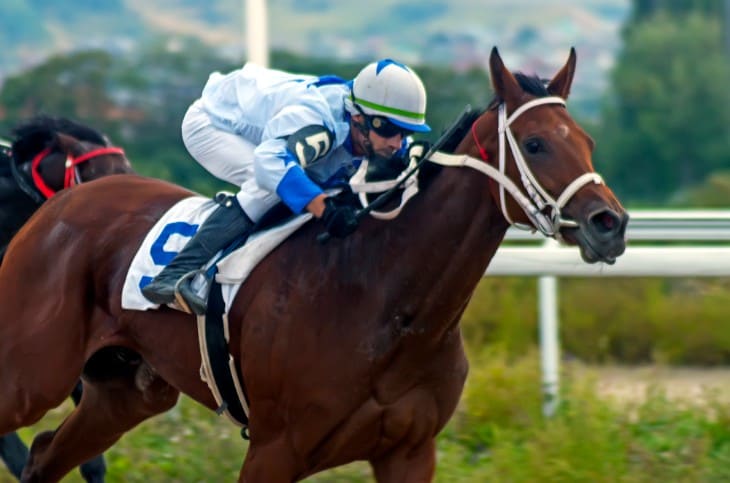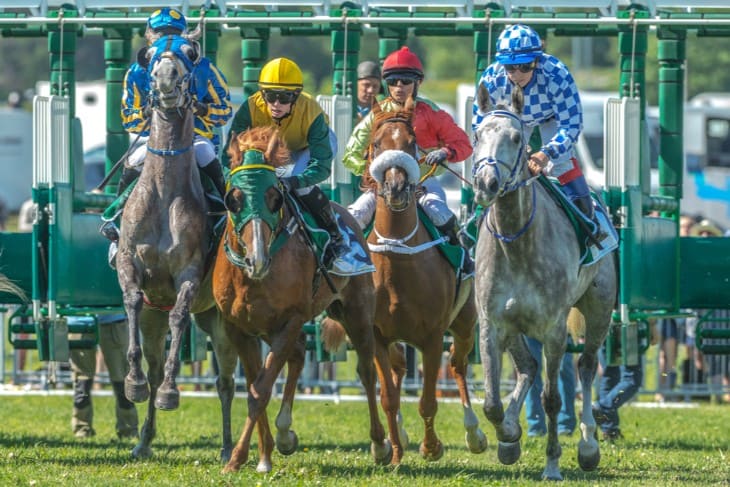Step into the exhilarating world where horse racing and social media collide, creating a thrilling new horizon for betting enthusiasts. As the thunder of hooves meets the buzz of online engagement, a dynamic fusion emerges, redefining how we experience the sport. From real-time updates that gallop across your screen to interactive challenges that put your predictions to the test, this is a realm where insights from industry pros and the pulse of the crowd converge. However, amidst the excitement, a responsible approach must guide us through this betting frontier.
Real-Time Updates
Real-time updates in the context of horse racing and social media play a pivotal role in keeping enthusiasts informed and engaged. Social media platforms like Twitter, Instagram, and even dedicated racing forums provide a constant stream of information regarding upcoming races, horse performance, jockey changes, track conditions, and more. This instant access to crucial details empowers bettors with the knowledge they need to make informed decisions.
Through hashtags, mentions, and accounts dedicated to horse racing, users can quickly aggregate information and discussions related to specific races or events. This real-time information flow creates a sense of community among bettors, trainers, jockeys, and racing analysts, fostering discussions and debates about strategies, potential outcomes, and unexpected developments.
Furthermore, real-time updates extend beyond text-based posts. Live videos and streaming services allow users to virtually attend races as they happen, enabling them to witness the action, analyze horse behaviour, and assess track conditions firsthand. This immersive experience not only enhances the engagement of bettors but also provides a platform for sharing reactions, emotions, and even celebrating wins or commiserating losses collectively. In this way, real-time updates on social media transform horse racing into a shared experience, connecting enthusiasts across the globe in the excitement of the sport.
Engagement with Industry Professionals
Engagement with industry professionals via social media has revolutionized the way horse racing enthusiasts access insights, expertise, and behind-the-scenes information. Jockeys, trainers, and racing analysts now have active social media profiles, allowing them to directly interact with fans and bettors. This direct engagement offers a unique opportunity for enthusiasts to gain valuable insights into the world of horse racing that was previously inaccessible.
Through platforms like Twitter and Instagram, industry professionals can share their perspectives on various aspects of the sport, including training techniques, horse behaviour, race strategies, and track conditions. Bettors can engage with these professionals by asking questions, seeking advice, and participating in discussions. This not only provides them with a deeper understanding of the sport but also enables them to make more informed betting decisions.
Industry professionals' firsthand accounts of their experiences and observations can offer a level of authenticity and credibility that enhances the betting experience. While enthusiasts should exercise critical thinking and consider multiple sources of information, engaging with professionals on social media allows for a direct connection between those who dedicate their lives to horse racing and those who are passionate about it. This symbiotic relationship creates a bridge between the sport's experts and its fans, fostering a richer and more interactive horse racing community.
Live Streaming
Live streaming has become a game-changer in the world of horse racing and social media, offering enthusiasts an immersive and real-time experience regardless of their physical location. Platforms like Facebook Live, YouTube Live, and Periscope (Twitter's live streaming service) have allowed horse racing events to be broadcast directly to viewers' screens, enhancing the accessibility and engagement of the sport.
Live streaming brings the excitement of the racetrack directly to the audience, allowing them to watch races as they unfold, witness the tension at the starting gate, and feel the adrenaline as horses sprint down the track. This real-time visual experience adds a layer of immediacy that traditional forms of media lack, making viewers feel like active participants rather than passive observers.
Moreover, live streaming opens up opportunities for bettors to make more informed decisions by observing the horses' behaviour, jockey tactics, and track conditions in real time. It enables viewers to assess the progress of their favoured horses and make on-the-spot judgments, enhancing the strategic aspect of horse race betting. This accessibility also extends to global events, enabling enthusiasts from different corners of the world to enjoy and engage with races they might not have otherwise been able to attend. However, it's important to note that just like with any form of information, viewers should approach live streaming with discernment and critical thinking, as the quality and accuracy of streams can vary.

User-Generated Content
User-generated content (UGC) has become a significant aspect of the horse racing and social media intersection, allowing enthusiasts to share their perspectives, predictions, and experiences with a wider community. Platforms like Twitter, Instagram, and horse racing forums have become virtual hubs for UGC, where individuals share their insights, strategies, and even personal stories related to horse racing and betting.
Enthusiasts often discuss race predictions, analyze past performances, and exchange opinions about horses, jockeys, and horse trainers. This collective knowledge-sharing creates a sense of camaraderie among bettors, and it can be particularly valuable for those new to horse racing, as they gain access to diverse viewpoints and strategies.
While UGC provides a platform for engagement and community building, it's important for users to exercise caution and discernment. Not all content shared by fellow enthusiasts is accurate or reliable. Misinformation and unfounded rumours can spread quickly through social media channels, potentially leading bettors astray. As a result, bettors should use their critical thinking skills to evaluate the credibility of the information shared and cross-reference it with more reliable sources before making any betting decisions.
Promotions and Offers
Promotions and offers related to horse racing on social media have transformed how betting companies attract and engage customers. Betting operators leverage the reach and interactive nature of platforms like Facebook, Twitter, and Instagram to promote their services and provide enticing deals to both existing and potential bettors.
These platforms allow betting companies to showcase special promotions, such as enhanced odds for specific races, free bets, or cashback offers. They can also run contests, challenges, and giveaways that encourage user participation and interaction. For instance, users might be asked to share their race predictions or betting strategies for a chance to win prizes or free bets.
By offering promotions and exclusive deals through social media, betting companies can tap into the immediacy and viral potential of these platforms. Users can quickly share offers with their networks, potentially expanding the company's customer base through word-of-mouth marketing. However, users should also exercise caution and thoroughly read the terms and conditions of these promotions, as they might come with certain requirements or restrictions.
Overall, the use of promotions and offers on social media not only increases engagement and excitement among horse racing enthusiasts but also serves as an effective marketing tool for betting companies to attract new customers and reward loyal ones.
Data Analysis
Data analysis has become an integral part of the horse racing and social media landscape, offering bettors a way to gather insights and make more informed betting decisions. Social media platforms provide a vast pool of data, including user discussions, sentiments, and trends related to horse racing events, horses, jockeys, and more. This data can be harnessed through various techniques, such as sentiment analysis and trend tracking.
Sentiment analysis involves using natural language processing to determine the general sentiment or mood expressed in social media posts and comments. By analyzing user opinions and emotions, bettors can gauge public perception and adjust their strategies accordingly. For instance, identifying a sudden surge in positive sentiment toward a particular horse might indicate that it's a favoured contender among the audience.
Additionally, data analysis can help bettors identify emerging trends and patterns. By monitoring discussions and interactions, bettors can spot shifts in interest, hot topics, or even potential insider information that could impact race outcomes. However, it's important to note that while data analysis can provide valuable insights, it should be used in conjunction with other research methods, as not all social media discussions are reliable or accurate.
In summary, data analysis of social media content related to horse racing enables bettors to tap into collective opinions, sentiments, and trends, enhancing their ability to make well-informed betting decisions. It's a tool that, when used carefully and in conjunction with other sources, can contribute to a more comprehensive understanding of the racing landscape.

Interactive Content
Interactive content has become a dynamic and engaging way to involve horse racing enthusiasts on social media platforms. Polls, quizzes, challenges, and interactive posts encourage bettors and fans to actively participate, share their opinions, and immerse themselves in the sport's discussions.
Polls and quizzes related to upcoming races, jockeys, or horse performances allow users to express their predictions and preferences. This not only stimulates engagement but also encourages critical thinking as users consider different factors before making their selections.
Challenges and contests are another form of interactive content that encourages user participation. Betting companies might launch challenges where users share their race predictions or creative content related to horse racing for a chance to win prizes. These challenges foster a sense of community and excitement, turning the betting experience into a social and collaborative endeavour.
Furthermore, interactive content nurtures a sense of ownership and involvement. When users actively contribute to discussions and predictions, they feel more invested in the outcomes of the races. This sense of engagement not only adds to the fun but also strengthens the connection between enthusiasts, social media platforms, and the horse racing community as a whole.
Access to Insights
Access to insights through social media has opened up a wealth of information and perspectives for horse racing enthusiasts. Analysts, experts, and even casual fans share their observations, predictions, and analysis, providing a diverse range of viewpoints for bettors to consider.
Horse racing experts often use social media platforms to share their in-depth analysis of races, horses, jockeys, and track conditions. Their insights can include historical performance data, training regimens, and even factors like weather and track surfaces that can influence race outcomes. These expert opinions offer bettors valuable information to complement their own research.
Furthermore, access to insights doesn't just come from experts. Casual fans who closely follow the sport might also share their unique observations and perspectives. They might notice subtle details about a horse's behaviour, a jockey's riding style, or other factors that could impact a race. Engaging with these user-generated insights can provide a more well-rounded understanding of the racing environment.
The access to insights provided by social media enriches the horse racing betting experience by offering a diverse array of information and viewpoints. Bettors can benefit from the collective wisdom of experts and fellow enthusiasts alike, enabling them to make more informed decisions when placing their bets.
Challenges and Risks
Challenges and risks are inherent when merging horse racing and social media in the context of betting. While social media offers a platform for real-time updates, engagement with experts, and community interaction, it also comes with potential pitfalls that bettors need to be aware of.
One of the significant challenges is the spread of misinformation and rumours. Social media platforms can amplify unverified information rapidly, leading to hasty betting decisions based on unreliable sources. Bettors must practice critical thinking and verify information from credible sources before making any decisions.
Another risk is the potential for addictive behaviour. The constant flow of real-time updates and engagement opportunities can lead to overindulgence in betting activities, particularly when accompanied by the excitement of social media interactions. Responsible gambling practices are crucial to avoid falling into unhealthy patterns and potential financial losses.
Additionally, the social pressure to conform to trends and opinions shared on social media can impact bettors' decisions. FOMO (fear of missing out) and the desire to align with popular sentiment can lead to impulsive bets that may not be well-researched. Bettors should stay true to their own analysis and strategies, rather than making decisions solely based on the opinions of others.
While the integration of horse racing and social media offers numerous benefits, challenges and risks must be navigated carefully. Practising critical thinking, responsible gambling, and maintaining an independent approach to decision-making is essential for bettors who engage with horse racing content on social media platforms.
Regulation and Responsibility
Regulation and responsibility are crucial considerations in the intersection of horse racing and social media, especially when it comes to betting. As the accessibility and engagement on social media platforms grow, ensuring responsible gambling practices becomes increasingly important to protect individuals from the potential harms of excessive betting.
Regulators and betting companies have a responsibility to implement measures that promote responsible behaviour. This might include age verification to prevent underage gambling, setting limits on betting amounts, and offering resources for individuals who may be struggling with gambling-related issues. Advertisements and promotions on social media should also adhere to ethical guidelines and avoid targeting vulnerable individuals.
For bettors, responsible gambling involves setting personal limits, both in terms of time and money spent on betting activities. It's important to approach betting with a clear understanding of the risks involved and to never bet more than one can afford to lose. Social media, with its fast-paced and engaging nature, can sometimes blur the lines between entertainment and serious gambling. Bettors should maintain a healthy balance and seek help if they find themselves exhibiting signs of problem gambling.
In essence, the combination of horse racing and social media in the realm of betting demands a collective effort to ensure that enthusiasts can enjoy the sport responsibly. Regulators, betting companies, and individual bettors all play roles in upholding ethical standards and minimizing the potential negative impacts of betting on social media platforms.
Summary
The convergence of horse racing and social media has created a new frontier for betting and engagement. Real-time updates provide instant information on races, horses, and conditions, while engagement with industry professionals offers direct insights from experts. Live streaming brings races to audiences worldwide, enhancing the betting experience. User-generated content fosters community discussions, but caution is needed to verify information. Promotions and offers attract bettors, data analysis aids decision-making, interactive content engages fans, and responsible regulation is essential to ensure ethical and informed betting practices in this dynamic landscape.
For more information:








